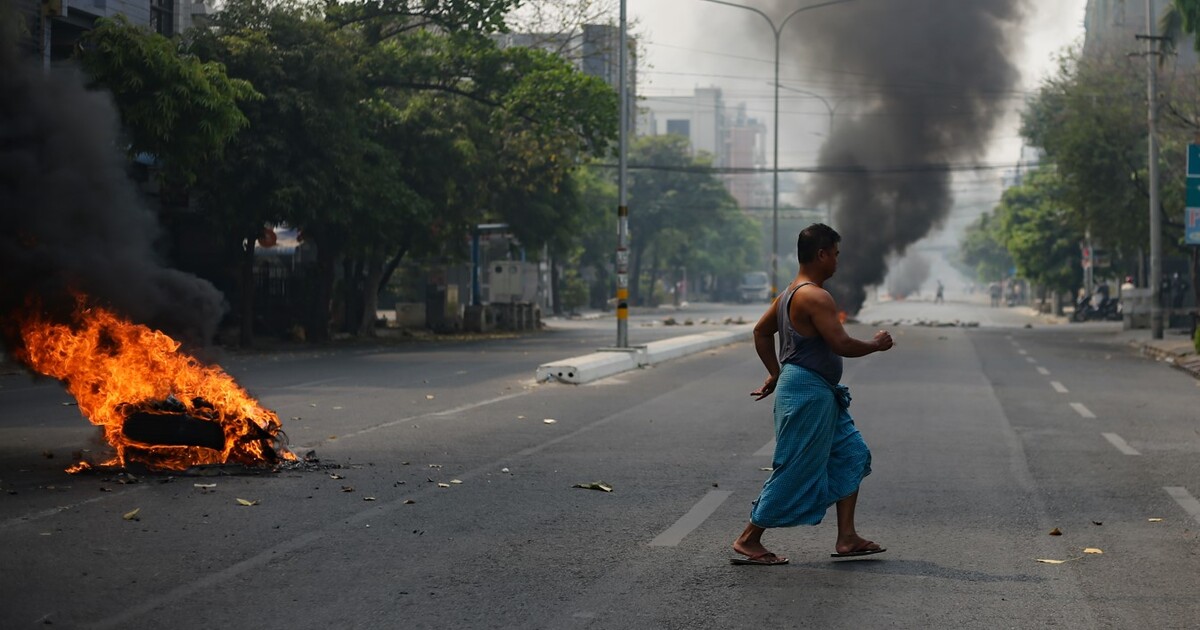Myanmar: From Failed State to Total Collapse?
The tide of the war in Myanmar is changing — and the world should be prepared for a junta collapse.
June 24, 2024

A Strategic Assessment Memo (SAM) from the Global Ideas Center
You may quote from this text, provided you mention the name of the author and reference it as a new Strategic Assessment Memo (SAM) published by the Global Ideas Center in Berlin on The Globalist.
Following the Myanmar military’s February 2021 coup, it seemed for a time that the junta — powered by the large size of the armed forces and the ability to get fairly modern war equipment from Russia and other suppliers — would crush the then-nascent unified resistance.
That resistance consisted of an alliance between ethnic armed organizations which have fought the central government for decades to retain their portions of Myanmar, and new groups of fighters — mostly disillusioned young people from central Myanmar who had given up on non-violence — who were training to battle as well.
Even throughout 2022, the situation seemed fairly grim for the anti-junta resistance. The junta — not caring about war crimes — could bomb whole villages. It also had a massive advantage in airpower and overall war materiel.
How times have changed
But in the past two years, the battle on the ground has shifted massively. This has the real possibility that the junta will lose the actual war — or implode on itself.
The harsh conditions within the Myanmar military, as well as the growing casualties of army lower-ranking soldiers, has depleted the junta’s ranks. This has led to growing numbers of defections of junta soldiers. These have not been replaced.
The junta, facing struggles in recruitment, has relied on forced conscription. In response, many young men are choosing to avoid by leaving the country.
Losing their lifeline
The junta’s advantage in materiel is waning too. Their primary supplier, Russia, is no longer able to supply Myanmar with most weapons. Russia needs them for its war in Ukraine.
To compensate, the junta has turned to North Korea. But it is not a real substitute for Russia.
Meanwhile, the resistance is capturing more advanced weapons from winning battles with junta forces. It can also increasingly access non-lethal assistance — still critical to the war — from the United States and other countries.
While China is still technically backing the junta, it is increasingly doubtful about the junta’s long-term survival and has opened talks with opposition forces.
And sanctions by the United States and other democracies on some of the Myanmar army’s key sources of revenue have drained the junta’s coffers as well.
Taking advantage
With the junta facing more problems, the opposition forces have gained growing control over large amounts of the country — some 60% by many estimates.
Indeed, in the past year, the opposition forces have taken large areas of land away from junta forces in areas in northern, north-eastern and western Myanmar.
The junta, increasingly depleted, is lacking enough rations to feed many of its men. As a result, it is losing even more soldiers.
Hitting where it hurts
The opposition has even managed to strike at the areas of the country in central Myanmar which are thought to be the junta’s biggest strongholds because they are heavily guarded with significant weapons.
Nevertheless, the opposition has attacked Naypyidaw, the military’s capital. It increasingly appears to be planning a campaign against Mandalay, another remaining army stronghold.
Indeed, the opposition, which at the beginning relied more on guerrilla attacks, has proven increasingly willing to take on junta forces in more open battlefield settings — and has won several of these fights.
Conclusion
The war is not over yet, but the pendulum has swung very hard.
Indeed, with Myanmar already essentially a failed state — with a non-working economy, massive internal migration and a collapsing social welfare system — foreign countries need to prepare for the possibility the junta could lose, or split among itself, with some members also trying to flee the country.
Instead of waiting for these possible scenarios, all foreign actors with an interest in the country should be developing plans for what happens the day after the junta falls.
That may be a day when the opposition — for now united around fighting the junta — could potentially start turning its guns on itself.
Takeaways
Following the Myanmar military’s February 2021 coup, it seemed for a time that the junta would crush the then-nascent unified resistance. No longer.
The tide of the war in Myanmar is changing — and the world should be prepared for a junta collapse.
Russia, the primary arms supplier of Myanmar's junta, is no longer able to supply it with most weapons. It needs them for its war in Ukraine.
China — while still technically backing Myanmar’s junta — is increasingly doubtful about its long-term survival and has opened talks with opposition forces.
With Myanmar already essentially a failed state, foreign countries need to prepare for the possibility the junta could lose — or split among itself.
A Strategic Assessment Memo (SAM) from the Global Ideas Center
You may quote from this text, provided you mention the name of the author and reference it as a new Strategic Assessment Memo (SAM) published by the Global Ideas Center in Berlin on The Globalist.


